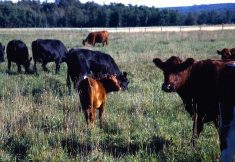On December 30, the Comprehensive and Progressive Agreement for Trans-Pacific Partnership (CPTPP) will come into force among the first tranche of signatories to the agreement: Australia, Canada, Japan, Mexico, New Zealand and Singapore. Canadian beef producers will benefit from the first tariff cut in 2018 during the holiday season, a development that is sure to boost the sense of seasonal goodwill as producers reflect on the year winding down and the prospects of a lower and more predictable tariff environment going forward.
Under the CPTPP, Canadian beef exports to Japan could double in 2019, up from the $160 million of beef exported to Japan in 2017 under the old tariffs on fresh and frozen beef. On December 30, Japan’s tariff of 38.5 per cent will immediately drop to 27.5 per cent on Canadian fresh beef and to 26.9 per cent on frozen beef. On April 1, 2019, Japan will implement a second tariff cut, down to 26.6 per cent on both fresh and frozen, and eventually down to nine per cent over several years. With CPTPP, Canadian beef will also be exempt from the Japanese safeguard tariff of 50 per cent on beef.
Read Also

Growing Canada’s beef herd: CCA’s priorities working with new federal government
This is my first column since the federal election. The Canadian Cattle Association works with all elected officials and parliamentarians, regardless…
The remaining five countries, Brunei, Chile, Malaysia, Peru and Vietnam, are continuing their ratification processes. Vietnam in particular is an emerging market with important growth potential for Canadian beef. Canadian beef exports to Vietnam in 2017 were $3.9 million with a 20 per cent tariff. Once Vietnam implements CPTPP in 2019, their initial two tariff cuts will immediately bring the tariff down to 6.6 per cent and then to zero in 2020.
The CPTPP, along with the recent United States-Mexico-Canada Agreement (USMCA), will create extraordinary growth opportunity for the Canadian agriculture and food sectors. It remains to be seen if the Democrats winning the House in November’s U.S. midterm elections may have an impact on the final approval of the USMCA. The Canadian Cattlemen’s Association (CCA) will be watching this situation closely in the months ahead.
In November, I participated in Agriculture and Agri-Food Minister Lawrence MacAulay’s trade mission to China, where he promoted Canadian agricultural products, including beef, and discussed ways of strengthening agricultural trade between the two countries. CCA participated in beef events in Shanghai and Beijing and was involved in meetings with the embassy and industry in the latter city. China is an important market with massive potential for Canada’s beef producers and CCA continues to advocate for expanded access in this politically complex market at every possible turn.
The Government of Canada’s renewed focus on trade diversification is very much appreciated by the CCA; however, the ability to meet the potential of new access requires that a number of competitiveness issues be addressed. At a roundtable session with Minister of International Trade Diversification Jim Carr in Winnipeg recently, the CCA and industry partners discussed the need to address, through labour policy changes, the chronic labour shortages within the agriculture and food sectors that will intensify as the global market for Canadian agricultural products rapidly expands. The need to enhance and modernize the capacity of transport routes was also brought forward. Concern was raised with regard to the appropriateness of the federal government’s carbon pricing policy for the Canadian agriculture and food industries. Suggestions were made that other tools may be more effective and less trade-deterring for the highly traded and globally competitive industry. As Canada is a leader in green agriculture and food production, future discussion regarding the appropriate tools to continue this leadership was suggested.
Canada’s leadership in sustainable beef production and the nutritional benefits of beef to human health were the main themes of a meeting I had with Minister of Health Ginette Petitpas Taylor in Ottawa. CCA staff and I shared our perspective about the food guide and front-of-package labelling with the minister, letting her know that red meat is an important part of a healthy and balanced diet, and of the need for Canadian health and nutritional policy to be based on sound and consistent scientific evidence. The perils of including misguided information in the food guide or on warning labels on foods high in saturated fat, like ground beef, could push people away from an affordable nutrient-dense protein staple of benefit to human health.
The CCA also continues to advocate for the need to amend Bill C-68 to protect fish habitat without undermining farmers’ ability to produce food in a sustainable manner. The CCA believes there is opportunity to work with the government to find solutions that will satisfy both perspectives.
In another positive development, in January 2019, Canada’s beef yield grade standards will change from the current three classes to five yield grade standards to mirror U.S. yield grade standards. The Canadian Beef Grading Agency said the move to five yield grade standards will allow alignment and transparency with the U.S. and will also provide enhanced distinction between higher- and lower-yielding carcasses providing the opportunity for improved targeted finishing practices.
The new year will be one of reinvention and re-examination of how best to take advantage of the opportunities. And with that, Bonnie and I would like to extend our heartfelt wishes for a joyous holiday season and a happy new year.
Until next time.
















